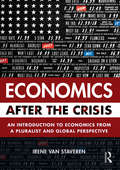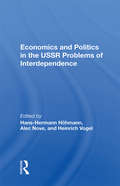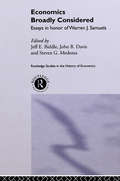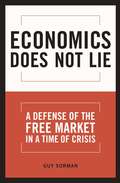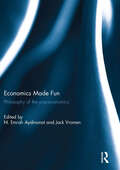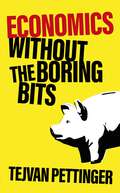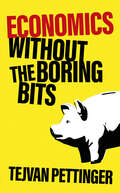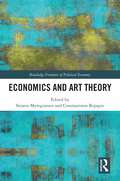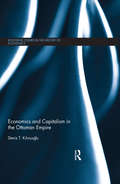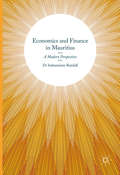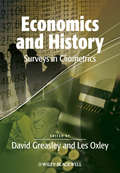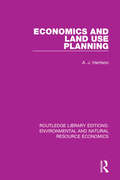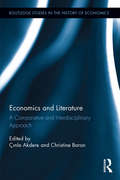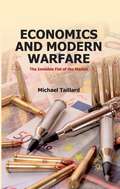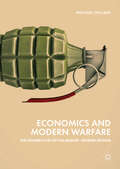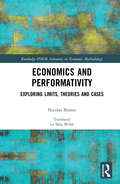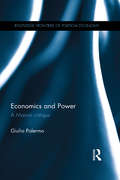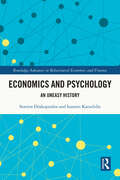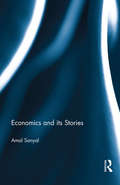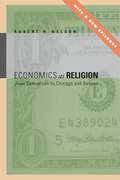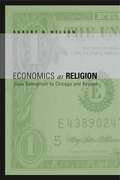- Table View
- List View
Economics After the Crisis: An Introduction to Economics from a Pluralist and Global Perspective
by Irene van StaverenEconomics After the Crisis is an introductory economics textbook, covering key topics in micro and macro economics. However, this book differs from other introductory economics textbooks in the perspective it takes, and it incorporates issues that are presently underserved by existing textbooks on the market. This book offers an introduction to economics that takes into account criticisms of the orthodox approach, and which acknowledges the role that this largely Western approach has played in the current global financial and economic crisis. A key feature of the book is its global approach: it offers examples from countries all over the world, including from developing and emerging economies. The chapters discuss all major economic topics, including individuals and households; the behaviour of consumers; the behaviour of firms; markets; the role of the state; public goods and commons; labour markets; capital markets; the macroeconomic flow; economic growth; international trade; nature and environmental externalities; poverty and wellbeing. Throughout, the book presents theoretical perspectives in which social structures, relatedness, uncertainty, and social norms provide key economic explanations, contrasting these with the idealized worldview of neoclassical economics. Economics After the Crisis is designed for a one-semester introductory course in economics, primarily at undergraduate but also at postgraduate level, and is suitable for students from a range of disciplines. It will be of particular relevance to those students with an interest in developing economies. https://www.coursera.org/learn/economicsfromapluralistperspective
Economics And Politics In The USSR: Problems Of Interdependence
by Alec Nove Heinrich Vogel Hans-Hermann HöhmannSoviet scholars have apparently stayed clear of meaningful analysis of such touchy subjects as interdependence and conflict in the relationship between economics and politics. Very little has been published on this issue—no surprise in a system that controls centrally both politics and the economy, with an emphasis on rapid economic development. The absence of meaningful Soviet research led the Federal Institute for East European and International Studies in Cologne to sponsor an international interdisciplinary conference on the subject. Contributions to the resulting book cover three main areas. The first includes the impact of traditional Russian political culture on contemporary Soviet economic thinking and behavior, the rank of economic aims in the priority system of Soviet politics, and the function of economic institutions in the implementation of political aims. The second concerns the role of political lobbies in the economy and repercussions of economic change for Soviet politics. Foreign economic relations and the USSR's foreign policy make up the third area. The concluding discussion reviews the state of international research and identifies areas for future study.
Economics Broadly Considered: Essays in Honour of Warren J. Samuels (Routledge Studies In The History Of Economics #Vol. 48)
by Steven G. Medema John B. Davis Jeff E. BiddleWarren J. Samuels has been a prominent figure in the study of economics in the twentieth century. This book brings together essays by leading scholars in the areas of economics in which Samuels has made his most important contributions: the history of economic thought, economic methodology, and institutional and post-Keynesian economics. This work
Economics Does Not Lie
by Guy SormanIn the 20th century, privatization and market capitalism have reconstructed Eastern Europe and lifted 800 million people - in China, Brazil, and India - out of poverty. In Economics Does Not Lie, noted French journalist Guy Sorman reveals that behind this unprecedented growth is not only the collapse of state socialism but also a scientific revolution in economics - one that is as of yet dimly understood by the public but increasingly embraced by policymakers around the globe.
Economics Explained: Everything You Need to Know about How the Economy Works and Where It's Going
by Lester C. Thurow Robert HeilbronerWell-written explanation of economic principles, taken from a well-known textbook for College by the same authors.
Economics Made Fun: Philosophy of the pop-economics
by N. Emrah Aydinonat and Jack VromenBest-selling books such as Freakonomics and The Undercover Economist have paved the way for the flourishing economics-made-fun genre. While books like these present economics as a strong and explanatory science, the ongoing economic crisis has exposed the shortcomings of economics to the general public. In the face of this crisis, many people, including well-known economists such as Paul Krugman, have started to express their doubts about whether economics is a success as a science. As well as academic papers, newspaper columns with a large audience have discussed the failure of economic to predict and explain ongoing trends. The emerging picture is somewhat confusing: economics-made-fun books present economics as a method of thinking that can successfully explain everyday and "freaky" phenomena. On the other hand, however, economics seems to fail in addressing and explaining the most pressing matters related to the field of economics itself. This book explores the confusion created by this contradictory picture of economics. Could a science that cannot answer its own core questions really be used to explain the logic of everyday life? This book was originally published as a special issue of the Journal of Economic Methodology.
Economics Without the Boring Bits: An Enlightening Guide To The Dismal Science
by Tejvan PettingerWhere does wealth come from? How is it different from money? Does government intervention prevent or create crises? What is the most effective way to protect the environment? In Economics Without the Boring Bits, Oxford-trained economist Tejvan Pettinger takes readers on an enlightening tour of the powerful, counter-intuitive and frequently startling insights of economic research, showing us that middlemen are good, recycling is bad (sometimes) and why some people get rich and others don't.This clear, compelling and engaging book breathes life into big concepts such as debt, finance, trade, money, taxation, supply, demand and all the other economic issues that worry us all yet relatively few truly understand.This is your guide to understanding economics – without the boring bits.
Economics Without the Boring Bits: An Enlightening Guide To The Dismal Science
by Tejvan PettingerWhere does wealth come from? How is it different from money? Does division of labour mean that the best people are hired to do the job? Does government intervention prevent or create crises? What is the most effective way to protect the environment? The great Scottish historian Thomas Carlyle dismissed economics as "the dismal science", yet it is at the heart of everything we do. Economics without the Boring Bits is a clear, comprehensive and richly anecdotal guide to debt, finance, trade, money, taxation, supply, demand and all the other big issues that worry us all yet relatively few truly understand. Oxford-trained economist Tejvan Pettinger takes readers on an enlightening tour of the powerful, counter-intuitive and frequently startling insights of economic research, showing us that middlemen are good, recycling is bad (sometimes) and why some people get rich and others don't. If you want to understand the wealth of nations without wading through The Wealth of Nations, this is the ideal place to start.
Economics Without the Boring Bits: An Enlightening Guide To The Dismal Science
by Tejvan PettingerWhere does wealth come from? How is it different from money? Does division of labour mean that the best people are hired to do the job? Does government intervention prevent or create crises? What is the most effective way to protect the environment? The great Scottish historian Thomas Carlyle dismissed economics as "the dismal science", yet it is at the heart of everything we do. Economics without the Boring Bits is a clear, comprehensive and richly anecdotal guide to debt, finance, trade, money, taxation, supply, demand and all the other big issues that worry us all yet relatively few truly understand. Oxford-trained economist Tejvan Pettinger takes readers on an enlightening tour of the powerful, counter-intuitive and frequently startling insights of economic research, showing us that middlemen are good, recycling is bad (sometimes) and why some people get rich and others don't. If you want to understand the wealth of nations without wading through The Wealth of Nations, this is the ideal place to start.
Economics and Art Theory (Routledge Frontiers of Political Economy)
by Stratos MyrogiannisDrawing on an interdisciplinary panel of contributors, this book presents a stimulating dialogue between economics and art theory and considers how this might aid our understanding of both areas of research. The collection explores themes which both fields share, including rationality, abstraction and model building, the nature of social reality, representation and transformation. The contributions employ a broad range of methods to investigate the links between economics and art, and their coverage includes architecture, history of ideas, art theory, literature studies and beyond. This innovative volume will be of interest to advanced students and scholars of economic theory, cultural economics, literary and art theory and it intends to be a starting point for new avenues of interdisciplinary research.
Economics and Capitalism in the Ottoman Empire (Routledge Studies in the History of Economics)
by Deniz KilinçoğluIs it possible to generate "capitalist spirit" in a society, where cultural, economic and political conditions did not unfold into an industrial revolution, and consequently into an advanced industrial-capitalist formation? This is exactly what some prominent public intellectuals in the late Ottoman Empire tried to achieve as a developmental strategy; long before Max Weber defined the notion of capitalist spirit as the main motive behind the development of capitalism. This book demonstrates how and why Ottoman reformists adapted (English and French) economic theory to the Ottoman institutional setting and popularized it to cultivate bourgeois values in the public sphere as a developmental strategy. It also reveals the imminent results of these efforts by presenting examples of how bourgeois values permeated into all spheres of socio-cultural life, from family life to literature, in the late Ottoman Empire. The text examines how the interplay between Western European economic theories and the traditional Muslim economic cultural setting paved the way for a new synthesis of a Muslim-capitalist value system; shedding light on the emergence of capitalism—as a cultural and an economic system—and the social transformation it created in a non-Western, and more specifically, in the Muslim Middle Eastern institutional setting. This book will be of great interest to scholars of modern Middle Eastern history, economic history, and the history of economic thought.
Economics and Finance in Mauritius
by Indranarain RamlallThis book offers a comprehensive assessment of the Mauritian economy and its financial system. The author investigates the pre- and post- crisis financial and economic environment of Mauritius thoroughly and looks to the future potential development of the economy. Chapters feature in-depth analysis of such aspects as the banking sector, the stock market, monetary policy, capital structure, the hedging practices of Mauritian firms, and the housing market in Mauritius, among others. Moreover, the author not only builds a credit risk model for Mauritian bankers, but also develops a financial stability model to provide the reader with a full account of the Mauritian economy. The author ends with a chapter dedicated to a 2030 vision for Mauritius. This book will be of interest to researchers, students, policy-makers, central bankers and economists who wish to explore an example of an upper-income developing economy in depth.
Economics and History: Surveys in Cliometrics (Surveys of Recent Research in Economics #6)
by Les Oxley David GreasleyEconomics and History presents six state-of-the-art surveys from some of the leading scholars in cliometrics. The contributions are all written at an accessible level for the non-specialist reader and consider a broad range of issues from this highly topical area. Written clearly and comprehensively, allowing easy accessibility for the non-specialist reader Brings together the very latest research in this highly topical subject from leading scholars Contributions cover a broad range of areas within this subject The latest publication in the highly successful Surveys of Recent Research in Economics Book Series
Economics and Land Use Planning (Routledge Library Editions: Environmental and Natural Resource Economics)
by A. J. HarrisonThe aim of this book, first published in 1977, is to use the tools developed by modern microeconomics to provide a framework for the analysis of policies towards the allocation of land and the control of activities using land. The principle focus of the book is the general justification for intervention in the urban land and property markets, the principles for evaluating such intervention and the proper role of the public sector within the urban economy. It also considers in some detail the practical problems involved in putting these principles into effect.
Economics and Literature: A Comparative and Interdisciplinary Approach (Routledge Studies in the History of Economics)
by Ҫınla Akdere Christine BaronSince the Middle Ages, literature has portrayed the economic world in poetry, drama, stories and novels. The complexity of human realities highlights crucial aspects of the economy. The nexus linking characters to their economic environment is central in a new genre, the "economic novel", that puts forth economic choices and events to narrate social behavior, individual desires, and even non-economic decisions. For many authors, literary narration also offers a means to express critical viewpoints about economic development, for example in regards to its ecological or social ramifications. Conflicts of economic interest have social, political and moral causes and consequences. This book shows how economic and literary texts deal with similar subjects, and explores the ways in which economic ideas and metaphors shape literary texts, focusing on the analogies between economic theories and narrative structure in literature and drama. This volume also suggests that connecting literature and economics can help us find a common language to voice new, critical perspectives on crises and social change. Written by an impressive array of experts in their fields, Economics and Literature is an important read for those who study history of economic thought, economic theory and philosophy, as well as literary and critical theory.
Economics and Modern Warfare: The Invisible Fist of the Market
by M. TaillardBy referring to a handful of battles throughout history, a new form of military strategy is derived through the manipulation of supplies, capital, and markets. This book combines economic theory with applied analyses of military successes and failures, explaining them simply for audiences of all levels of interest.
Economics and Modern Warfare: The Invisible Fist of the Market
by Michael TaillardThis book demonstrates how economic tools have been used throughout history to accomplish goals of military conflict, how they can be used more effectively than traditional means of warfare in the modern era, and how we can derive a better understanding of economic strategy applicable not just to the military but also to market competition. This new edition includes a thorough updating of chapters on advances in our understanding of economic warfare and more recent examples, such as ISIS’s reliance on obtaining control over oil production facilities, North Korea’s nuclear program, and China’s emphasis on scientific research and technological innovation. This edition also features an entirely new chapter on the commercialization of the conflict over the region of Kashmir.
Economics and Performativity: Exploring Limits, Theories and Cases (Routledge INEM Advances in Economic Methodology)
by Nicolas BrissetEconomists do more than merely describe an external economic world. They shape it in the image of their theories and models. This idea, following the philosophy of language, puts forward that economic theories are performative, and not only descriptive. This idea has become a powerful critique of the scientificity of economics since it removes the idea of an external world against which our description could be evaluated as truth. If any theory can become true, there are no true theories per se because there is no such thing as a pre-existing economy to describe. Is such a relativist stance a fatality? This is the question at stake in this book. Furthermore, the author asks if any theory is able to ‘perform’ the social reality, or are there actually some limits to performativity? For philosophers, a performative statement is a statement that cannot fail to mean something, but can fail to do what it calls for. The state of the world may or may not be changed; the performative statement may be happy or unhappy. In economic terms, this can be interpreted as: some theories change the world while some do not. This book argues that this possibility of failure, a perspective previously missing from discussions on the subject, should be at the heart of any definition of failure. Taking on the question of why some theories change the world while others do not, this volume will be of interest to those studying advances courses on the philosophy of economics as well as those studying and researching in the areas of the philosophy of sciences and sociology of science and economics.
Economics and Power: A Marxist critique (Routledge Frontiers of Political Economy)
by Giulio PalermoIn the economic debate, power is defined and studied mainly as an interpersonal relation occurring out of perfect competition. This is a consequence of the combination of methodological individualism and the assumption of competition as a natural and everlasting coordinating mechanism, operating without any sort of coercion. This methodology, however, is not adequate to analyze the forms of social coercion that characterize capitalism. Economics and Power criticizes the main theories of power developed in economic literature, analyzing ultraliberal contractualism to radical political economics, and ultimately suggesting a Marxist conception of power and coercion in capitalism. Palermo’s ontological argument is rooted in the philosophy of ‘critical realism’.This unique volume presents his main finding as being that the essential coercive mechanism of capitalism is competition. Capitalist power is not caused by a lack of competition, but by the central role it plays in this mode of production. Following this, the chapters reconstruct a Marxian conception of power where it is analyzed as a social relation and argues that perfect competition does in fact exist under the disguise of capitalist power. This book criticizes the construct of power and the underlying ideas surrounding perfect competition. This book is of interest to those who study political economy, as well as economic theory and philosophy.
Economics and Psychology: An Uneasy History (Routledge Advances in Behavioural Economics and Finance)
by Stavros Drakopoulos Ioannis KatselidisWith the rise of modern behavioural economics and increasing interest in subjective well-being research, the question of the relationship between economics and psychology has again been brought to the fore. Drawing on the history of economic thought, this book explores the historical relationship between the two disciplines. The book opens with a description of the primary philosophical foundations for early arguments supporting the interplay between economics and psychology. Both classical economists and other prominent pre-marginalists writers are examined in this context. The ensuing discussion explores the marginalist revolution and how well-known economists like Jevons and Edgeworth, influenced by pre-marginalist writers, incorporated ideas and findings from psychology. The book then describes how, following the so-called “Paretian turn”, early neoclassical economists attempted to expel psychological concepts from economic analysis. Combined with the increasing formalization, the influence of the classical physics scientific ideal, and the impact of positivism, this methodological stance became dominant in modern mainstream economics. In contrast, non-mainstream traditions continued to acknowledge the significance of psychology in their economic analysis. Thistradition includes inter alia the so-called old behavioural economics, mainly of Herbert Simon and George Katona. The revival of psychology in economics came mainly with the emergence and development of new behavioural economics as a distinct branch during the last few decades. The trend was further assisted by the emergence of the economics of subjective well-being. Finally, the book briefly explores the state of the current debate concerning the relationship between economics and psychology. This book will be invaluable reading to anyone interested in the history of the study of economics and psychology, as well as of great interest to students and scholars of history of economic thought, psychological economics, behavioural economics and the history and philosophy of social sciences.
Economics and its Stories
by Amal SanyalThe book explains the basic ideas of economics along with their historical context. It includes the events and traditions of the era of mentors—Smith, Ricardo, Marx, Walras, Keynes—with the economics they developed and controversies around them.
Economics and the Historian
by Peter H. Lindert Thomas G. Rawski Susan B. Carter Jon S. Cohen Stephen Cullenberg Donald N. Mccloskey Hugh Rockoff Richard SutchThese essays provide a thorough introduction to economics for historians. The authors, all eminent scholars, show how to use economic thinking, economic models, and economic methods to enrich historical research. They examine such vital issues as long-term trends, institutions, labor--including an engaging dialogue between a labor historian and a labor economist--international affairs, and money and banking. Scholars and teachers of history will welcome this volume as an introduction and guide to economics, a springboard for their own research, and a lively and provocative source of collateral reading for students at every level. The combined research experience of these authors encompasses many varieties of economics and covers a kaleidoscopic array of nations, subjects, and time periods. All are expert in presenting the insights and complexities of economics to nonspecialist audiences.
Economics and the Public Purpose
by John Kenneth GalbraithThe third and most important of Galbraith's major works brings completely into focus his model of our modern economic society.
Economics as Religion: From Samuelson to Chicago and Beyond
by Robert H. NelsonRobert Nelson’s Reaching for Heaven on Earth, Economics as Religion, and The New Holy Wars: Economic Religion Versus Environmental Religion in Contemporary America read almost like a trilogy, exploring and charting the boundaries of theology and economics from the Western foundations of ancient Greece through the traditions that Nelson identifies as “Protestant” and “Roman,” and on into modern economic forms such as Marxism and capitalism, as well as environmentalism. Nelson argues that economics can be a genuine form of religion and that it should inform our understanding of the religious developments of our times. This edition of Economics as Religion situates the influence of his work in the scholarly economic and theological conversations of today and reflects on the state of the economics profession and the potential implications for theology, economics, and other social sciences.
Economics as Religion: From Samuelson to Chicago and Beyond
by Robert H. NelsonIn this study, Robert H. Nelson explores the genesis, the prophets, the prophesies, and the tenets of what he sees as a religion of economics that has come into full blossom in latter-day America. Nelson does not see "theology" as a bad word, and his examination of the theology underlying Samuelsonian and Chicagoan economics is not a put-down. It is a way of seeing the rhetoric of fundamental belief—what has been called "vision."
